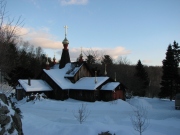
Deliberate, thoughtful and wise. In The Spirit of Happiness shuffles into your dusty, dark cabin at the dawn of a new day. It tosses aside the curtains directly in front of the lumpy mass of sheets you’re sleeping in. It hefts up the window as well. The brilliance of morning asserts itself among you and finally in you.
You wake up. Not in a fit, this isn’t a revelation.
You live after all. You and the rest of the world are nonchalantly aware of this period of the day. But if you’re like me, on most mornings, you’re slightly hung over, you’re dying for coffee. You aren’t present in this gift of a moment. You’ve succumb to the repetition and ennui of modern-day demands and grogginess clouds your awareness.
You wake up. A deliberate decision slowly precipitates in your synapses. If not for the prodding of In The Spirit of Happiness, you might wander trance-like for the rest of the day through the confines of your self-imposed house arrest. But this book ignites a pilot light in appreciating every single glorious moment of each day.

The New Skete monastery
The book begins when The Seeker arrives at the airport to be picked up by Father Laurence of the New Skete monks. The Seeker is restless and unsatisfied. He’s come to gain knowledge from these respected brothers. Father Laurence brings one of their renowned German Shepherds along with him for the ride. The monks use dog training as one of several sources of revenue for this monastery which is equally ancient, reverent and avant-garde. In their initial ride together, Father Laurence is circumspect and genuine. He and The Seeker have a sparse but insightful conversation about the brothers’ life together and the itch under the Seeker’s skin which brings him on this journey.
“‘Meet Ivy. No need for alarm, she’s a real sweetheart. Hop in.’
The second the Seeker got into the car, Ivy shamelessly started licking his ears, and when Father went to the other side of the car, he tapped on the window and told Ivy to lie down in the back of the wagon. She obeyed without protest.
…Father Laurence turned around and asked casually, ‘So you’re serious enough about this to have flown to New York. How about telling me a bit about yourself?’
…Despite feeling mildly awkward, he began to stumble through a more detailed self-portrait, filling in facts that he had either omitted or only briefly alluded to in his correspondence. Father Laurence listened intently, and as they spoke the Seeker quickly began to forget his self-consciousness. The monk would nod his head and smile from time to time, and at several points he laughed heartily, making no effort to conceal his delight. Yet he always seemed one step ahead of the Seeker’s last sentence, as if he were listening to a story he already knew. Finally he asked:
‘And what have you learned through all of this?’
Somehow the Seeker was hoping that the monk would tell him that, though it was clear from the ensuing silence that he had no intentions of doing so. He thought for several moments, vaguely aware of the colorful foliage gliding by. … At last the Seeker replied, ‘I’ve learned that the whole world’s asleep — myself included.’
Father Laurence recounts the story of how the monastery was founded on a group of brothers’ desire to return to the past reverence of the Church, but also a sincere desire to lead a monastery into unchartered territories of liberalism or maybe more precisely, a more open-armed posture of loving. This presented them with the ultimately humbling and paradoxical task of separating the inextricable duties to uphold the purity of conviction and spirit of the original Church and maintaining a continuation of relevance and relation to the current age. Add to that their equally unusual marriage of the Greek and Roman Catholic church traditions.
As The Seeker engages with the brothers, he comes to understand their collective unblemished love of God and of others. They set upon themselves the heavy yoke of mornings which begin as the sun rises, laden with manual, menial labor. Additionally they pull perhaps an even heavier yoke by casting off the gruff and callous chores of the first yoke in order to sing praises to the Lord, worship in full piety or lead tour groups through their estate, their philosophy and way of life; utterly content and joyous, basking continuously in the presence of the Lord. This transition occurs without self-righteous pride in either their role as the salt of the earth or light of the earth.
Through their down-to-earth wisdom, the brothers at New Skete help us to realize that no matter where we are, we have the tools, means and fertile seed of happiness within us at all times. Happiness is cultivated in simplicity and joy. In training dogs, making meats, baking pies, prayer and meditation.
“And the peace of God, which transcends all understanding, will guard your hearts and your minds in Christ Jesus.” – Philippians 4:7 NIV
- The Nuns of New Skete Make Cheesecakes – NYTimes.com (worldhistoryreview.org)
Thanks for reading! And please let me know what you think.

Posted on April 7, 2013
0